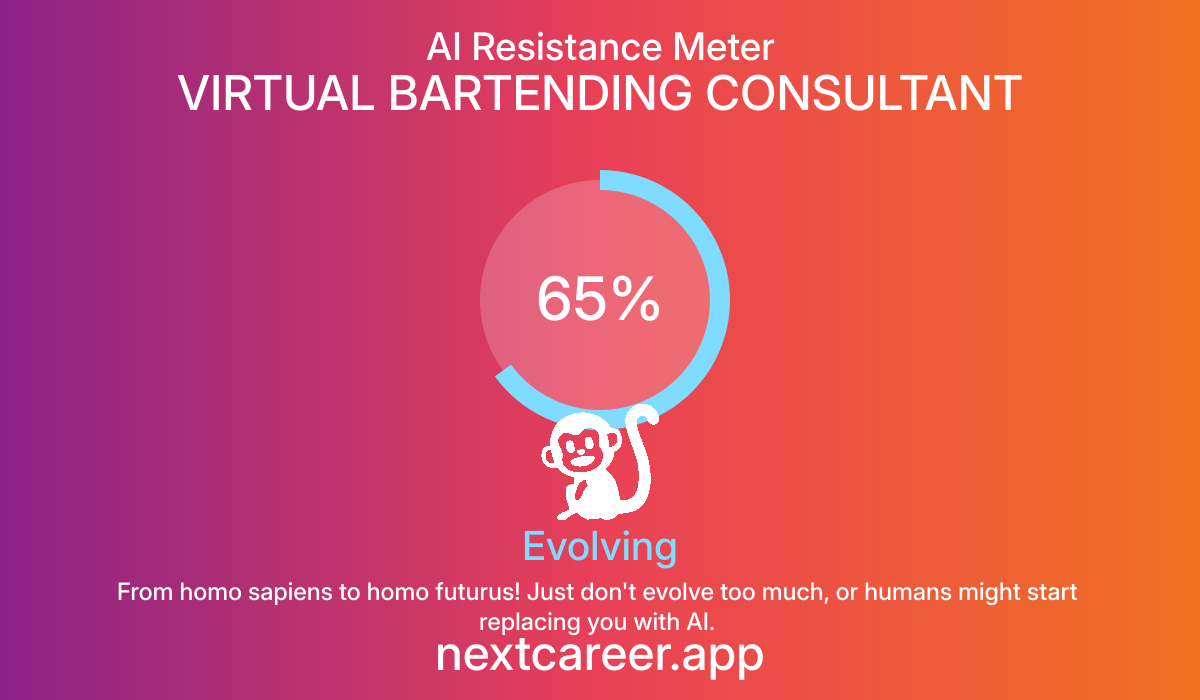AI Resistance Analysis
VIRTUAL BARTENDING CONSULTANT
VIRTUAL BARTENDING CONSULTANT
AI Resistance Score
AI Resistance Meter
Evolving
VIRTUAL BARTENDING CONSULTANT
You're upgrading faster than a computer from the 90s! Just remember, even flip phones thought they were the pinnacle of evolution once.
The role of a Virtual Bartending Consultant combines a variety of tasks that involve cognitive decision-making, emotional intelligence, and a degree of creativity, making it moderately resistant to AI in both the near and long-term future. While AI can automate certain aspects of virtual bartending, such as recipe recommendation or inventory management, the nuances of customer engagement and personalized service are harder to replicate. Additionally, the evolving nature of consumer preferences and experiences in hospitality will necessitate human intuition and creativity.
The role of a Virtual Bartending Consultant combines a variety of tasks that involve cognitive decision-making, emotional intelligence, and a degree of creativity, making it moderately resistant to AI in both the near and long-term future. While AI can automate certain aspects of virtual bartending, such as recipe recommendation or inventory management, the nuances of customer engagement and personalized service are harder to replicate. Additionally, the evolving nature of consumer preferences and experiences in hospitality will necessitate human intuition and creativity.
Key Factors
- Cognitive Tasks: This role requires knowledge of mixology, customer preferences, and trends. AI can handle recipe data but may struggle with contextual decision-making.
- Emotional Intelligence: Effective customer interaction involves empathy and understanding, which are currently challenging for AI.
- Physical Skills: While physical bartending skills are less relevant in a solely virtual environment, there could be a hybrid model that involves physical cocktail-making for virtual tasting events.
- Creative Thinking: Creating unique drink recipes and themed experiences will still rely heavily on human creativity and cultural relevance.
Human Advantages
- Ability to build personal relationships with clients through emotional connection.
- Creative input into themed events and customized experiences based on understanding of customer preferences.
- Adaptability to changing trends in customer tastes and habits.
AI Vulnerabilities
- Basic recipe advice and inventory suggestions can be automated by AI systems.
- Standardized responses to customer inquiries could be provided by chatbots.
Recommended Actions
- Develop expertise in customer interaction and emotional intelligence to differentiate from AI capabilities.
- Incorporate technology into the role to enhance offerings, such as AR experiences or interactive virtual events.
- Stay updated with beverage trends and customer preferences to provide personalized and culturally relevant experiences.
In the near-term (5 years), the role may see significant augmentation through AI tools that assist with data and analytics for trends. However, true virtual bartending requires a human touch that maintains customer engagement. By the long-term horizon (20+ years), if AI becomes adept at emotional engagement, the role might evolve to focus more on creative event design and less on direct interactions.

Why Calculate AI Resistance?
Understanding how AI-resistant your career is becoming increasingly important in today's rapidly evolving job market. Our analysis combines multiple factors including required human skills, technological adaptability, and future industry projections to give you a comprehensive view of your career's sustainability.